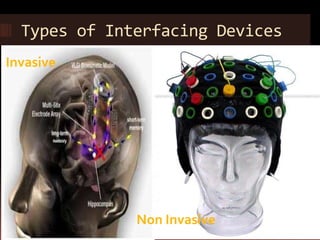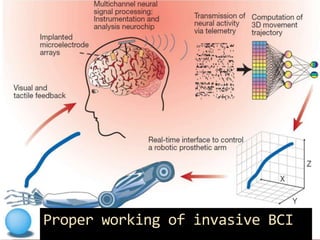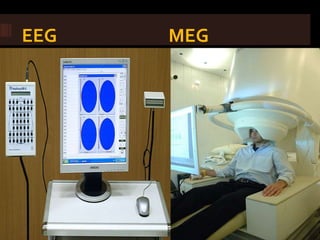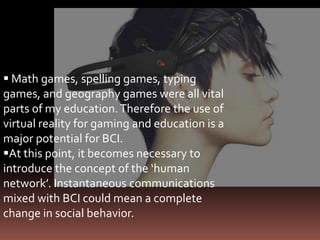neuralinterfacing-130331081952-phpapp01.pdf
- 2. Introduction . Research to develop systems that can help restore sensory function, communication, and control to impaired humans is coalescing into a new branch of experimental neuroscience, variously named brain-machine interfaces (BMIs), brain-computer interfaces (BCIs), neural prostheses, or neural interface systems (NISs).
- 3. The ultimate goal of neural interface research is to create links between the nervous system and the outside world either by stimulating or by recording from neural tissue to treat or assist people with sensory, motor, or other disabilities of neural function We address the potential for neural interface research to enhance basic scientific understanding of brain function by offering unique insights in neural coding and representation, plasticity, brain- behavior relations, and the neurobiology of disease Finally, we discuss technical and scientific challenges faced by these systems before they are widely adopted by severely motor-disabled patients.
- 4. History Monkey operating a robotic arm with brain–computer interfacing (Schwartz lab, University of Pittsburgh).
- 5. Diagram of the BCI developed by Miguel Nicolelis and colleagues for use on Rhesus Monkeys.
- 6. BCI ’s recent successes.
- 7. The Brain as a Computer Chemical Entity Electrical Entity
- 8. Types of Interfacing Devices Invasive Non Invasive
- 9. Invasive BCI
- 10. Proper working of invasive BCI
- 11. Non Invasive BCI Devices J
- 12. EEG MEG
- 13. Non invasive BCI Operating Environment
- 15. NIS Methods P300 Detection EEG mu Rhythm conditioning VEP Detection
- 16. P300 The P300 (P3) wave is an event related potential (ERP) component elicited in the process of decision making. It is considered to be an endogenous potential, as its occurrence links not to the physical attributes of a stimulus, but to a person's reaction to it. Since the mid 1980s, one of the most discussed uses of ERPs such as the P300 is related to lie detection.
- 17. EEG mu rhythm The EEG mu rhythm is believed to reflect an underlying execution/observation matching system. These findings suggest that there is execution/observation matching system dysfunction in individuals with autism and that this matching system is related to degree of impairment in imitation abilities.
- 18. VEP Detection A visual evoked potential is an evoked potential caused by a visual stimulus, such as an alternating checkerboard pattern on a computer screen. A doctor may recommend that you go for a VEP test when you are experiencing changes in your vision that can be due to problems along the pathways of certain nerves.
- 20. Training BCI Devices While ones first impression of a BCI device may be a surgical implant, or a wireless headset that immediately allows a human to control whatever device it is connected to, unfortunately this isn’t the case. One important issue of BCI devices is the training requirement. For motor or sensory enhancement, these devices require months of physical therapy before they become effective. Before data transfer techniques can be used, the subject must be trained on how to ‘think’ in order to control their devices.
- 21. BCI Training
- 22. BCI vs. Neuroprosthetics Nueroprosthetic control process
- 23. BCI control process . Brain Computer Interfaces are considered to be a direct signal conduit between the brain and an external computing device.
- 24. Applications of BCI Medicine Military Manufacturing Gaming Communication Social Potential
- 25. Prime use of neural interface Medical application: Robotic Prosthesis External Memory
- 26. Math games, spelling games, typing games, and geography games were all vital parts of my education.Therefore the use of virtual reality for gaming and education is a major potential for BCI. At this point, it becomes necessary to introduce the concept of the ‘human network’. Instantaneous communications mixed with BCI could mean a complete change in social behavior.
- 30. Ethical Considerations for NISs The potential for BCI connections to violate privacy- allowing an intruder to ‘read your thoughts’. Harmful effects of BCI implements to the brain. Having one’s external memories stolen (from an external memory device). Corporate memory (from an external memory device) overriding personal memory.
- 31. Conclusion Certainly the applications for BCI devices discussed in this paper are long reaching, and BCI devices are not currently powerful enough to perform the tasks mentioned above. But the possibility of ‘thought control’ machines would eliminate a bottleneck in data processing and computer interaction including communications that would improve not just the environment but people themselves.






























